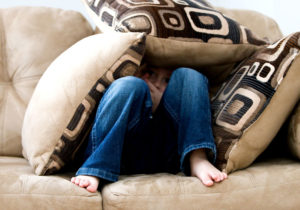
If you told me your kids are your world, your pride and joy, your everything, I’d believe you in an instant. For most parents, their kids are their greatest accomplishment. They’ve spent their lives nurturing and protecting their children. So it’s completely understandable that a parent wouldn’t want to appear weak or pained in front of his or her children. However, if you’ve been struggling with addiction and treatment is in your plan, your kids need to know.
But we completely understand that telling your kids about treatment is hard. You don’t want them to think that you have a problem or that you’re abandoning them to take care of it. Treatment is a necessity but it’s also a blessing. It’s not a sign of weakness but rather a move to make yourself a better person and parent. Your kids will understand . . . they just need to be told in the right way.
Tips for Telling Your Kids About Treatment:
Young Children (Under 10)
 The biggest concern parents have with young children is that they don’t want the kids to feel like they’re being abandoned. In reality, you’re doing the complete opposite. You’re helping your kids by helping yourself. The first decade of a child’s life is extremely significant in shaping the way a child goes into the future. The experiences a child faces in his early years are carried with him through his entire life. So, it’s understandable that you might be afraid that leaving to get help will negatively affect the child. But if you help your child understand what you’re doing and why you’re doing it, getting help can have the complete opposite effect on a child.
The biggest concern parents have with young children is that they don’t want the kids to feel like they’re being abandoned. In reality, you’re doing the complete opposite. You’re helping your kids by helping yourself. The first decade of a child’s life is extremely significant in shaping the way a child goes into the future. The experiences a child faces in his early years are carried with him through his entire life. So, it’s understandable that you might be afraid that leaving to get help will negatively affect the child. But if you help your child understand what you’re doing and why you’re doing it, getting help can have the complete opposite effect on a child.
Tips:
-
Explain exactly what you’re doing
Kids are more intuitive than we think, even when they seem too young to understand. They probably already sense that something is wrong, whether they’ve seen you openly use drugs or not. Seeking treatment without explaining the process to your kids in hopes of shielding them from the reality of addiction is a huge mistake. Explaining to them that sometimes adults need help too and that that’s exactly what you’re doing is a much more appropriate strategy.
-
Give them the opportunity to ask questions
Kids learn by asking questions. There’s no doubt that they’ll have questions when you tell them that you’re getting help for yourself. If they don’t speak out right away, make sure they feel like they’re allowed to ask questions. Try explicitly asking, “Do you have any questions for me about what’s going on?”
-
Make them feel like they’re part of the process
You need to be the one who decides that you need help. But after you make that decision, allow your kids to be part of it. You’re a huge part of your kids’ lives just as your kids are undoubtedly a huge part of your life. The easiest way to keep them from feeling abandoned is to make them feel like they’re part of the decision process. For example, try showing them pictures of the facility you’ll be going to if it has a website.
Pre-Teens (10-12)
 The pre-teen age is already a complicated time for children. They’re transitioning between elementary levels, starting to go through puberty, and trying to figure out where they belong. So adding on the fact that their parent needs treatment for addiction can seem like too much. You may feel uneasy telling them about treatment because you’re afraid it’ll be the tipping point on the already-confusing transitional period they’re currently in. But you can’t let that stop you from explaining treatment to them.
The pre-teen age is already a complicated time for children. They’re transitioning between elementary levels, starting to go through puberty, and trying to figure out where they belong. So adding on the fact that their parent needs treatment for addiction can seem like too much. You may feel uneasy telling them about treatment because you’re afraid it’ll be the tipping point on the already-confusing transitional period they’re currently in. But you can’t let that stop you from explaining treatment to them.
Tips:
-
Give them the facts
Because pre-teens are in such a transitional point in their lives, they’ll likely grasp for stability in situations such as treatment. Facts create stability. Tell them things like where you’re going, how long you’ll be gone for, and what the treatment program actually does.
-
Tell them it’s not a choice
When older kids don’t fully understand something, they’ll likely try to rebel. This doesn’t mean that they’ll run away or get into substance abuse themselves. But they may try to shut you out or act like you’re choosing to leave. Make sure you tell your kids that treatment is not a choice. Tell them that you have to do this in order to get better.
-
Have the conversation somewhere your kids feel comfortable
Treatment is not a bad thing. It’s quite the opposite, actually. Your kids need to know that. The best way to do that is to make the conversation comfortable to begin with. Go to your kid’s favorite restaurant for a lunch date or sit down to talk at the park. Your child is much more likely to respond positively if they feel comfortable from the start.
Teens (13-18)
 Oh, teenagers. They get such a bad rap. But don’t discount their ability to approve of you getting treatment for your addiction. Teenagers don’t have to be the angry, aloof, hard-to-talk-to rebels that we make them out to be. They are entirely capable of understanding why you need treatment and then supporting you through the process. You just need to include them.
Oh, teenagers. They get such a bad rap. But don’t discount their ability to approve of you getting treatment for your addiction. Teenagers don’t have to be the angry, aloof, hard-to-talk-to rebels that we make them out to be. They are entirely capable of understanding why you need treatment and then supporting you through the process. You just need to include them.
Tips:
-
Put yourself on their level
You are the parent and remaining in control of your family is important. That said, teens don’t respond well to being treated like children. Explain to them that you need help and you are for sure going to get treatment while also asking what they think. That will show them that you’re considering their feelings and views.
-
Share the details
If you’re comfortable with it, share with your teenager details like what type of drug you’ll be detoxing from. They’ll appreciate your honesty. It also gives them the opportunity to do their own research on their own time outside of your conversation. On a side note, your teen might have already experimented with alcohol or drugs. Sharing details about your struggle might even help open their eyes to the dangers of substance abuse so that they don’t suffer through the same struggles you have.
-
Give them time to process
Addiction treatment is a big deal. You can’t expect anyone to understand it right away, let alone a kid who is being told that his or her parent needs it. It’s not easy to hear that your parent is struggling, especially if you also have schoolwork, sports, college applications, and a social life to worry about. Your teenager may be silent or he may have a lot of questions. Either way, give him time to process the information you’ve shared.
Treatment will take you out of your addiction struggle. It will also give you the room and the tools to be a better person moving forward. And that’s important to your kids. You can’t help your kids navigate their lives if you’re struggling in yours. Treatment is not forever but your bond with your children is. And it will only be strengthened in recovery.
If you or someone you know is struggling with addiction, don’t hesitate to reach out to us. Call our staff at 855-737-7363 or talk to us through our live chat. New Start is here to help you.

